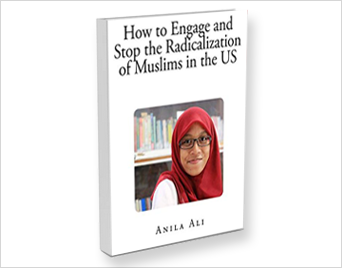“How to Engage and Stop the Radicalization of Muslims in the US”
In 2009, Anila Ali was invited to the Obama White House to present recommendations on how to stop extremism. For her recommendations, Ali drew on her work with at-risk youth and parents in local communities, as well as her partnerships with law enforcement officials. The paper proposed constructive common-ground solutions that could meet the needs of both Muslims families and national security.
In 2015, Ali returned to Washington as a speaker at President Obama’s White House Summit on Countering Violent Extremism. Her message for policymakers and community leaders includes the following:
- American Muslims Squeezed: Muslims Americans face external and internal challenges. From outside, far-right bigots argue we do not belong in American society, while far-left activists tokenize us as perpetual victims. From inside, extremist groups act in our name and pressure us not to publicly criticize them. Meanwhile, our community remains divided on ethnic and sectarian lines, and we are dragged down by repression in many parts of the Muslim world.
- Reject Victimhood: Despite facing discrimination, Muslims will not find a solution in embracing grievances and victimhood, which are toxic and self-defeating. Walking around with resentment and blaming others does not uplift or solve our problems. Victimhood in fact is used by extremists to radicalize young people, who instead need positive messages of overcoming and accountability to succeed in American society.
- Muslim Far-Right: American Muslims have been struggling with an internal far-right for decades. Starting in the 1960s Islamist movements built the first major community institutions with foreign funding. This far-right dominates many Muslim institutions and tries to impose their radical values on us. Their ideology reinforces Islamophobic stereotypes and breeds resentment.
- Empower the Silent Muslim Majority: Despite the challenges, there are millions of American Muslims who are proud of their heritage and proud of America. Community leaders and government officials can help these voices be heard as a positive influence to benefit American society.


